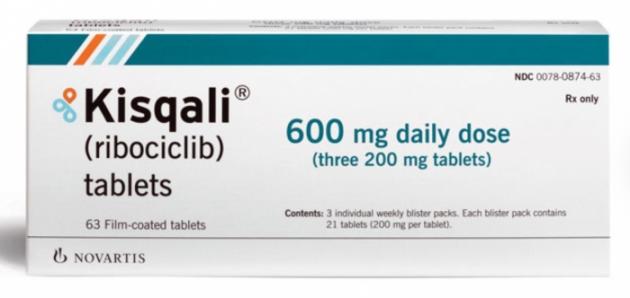CHICAGO, Ill. -- Novartis Kisqali, a cyclin-dependent kinase (CDK) 4/6 inhibitor, has always fallen behind from its competitors such as Pfizer's Ibrance and Lilly's Verzenio. However, with its latest Kisqali's Monaleesa-7 study, the Swiss-based multinational firm hopes to gain an edge over its competitors.
The phase 3 Monaleesa-7 trial evaluated Kisqali plus endocrine therapy (goserelin plus either an aromatase inhibitor or tamoxifen) as initial treatment compared to endocrine therapy alone in pre- and perimenopausal women with hormone receptor-positive, human epidermal growth factor receptor-2 negative (HR+/HER2-) advanced or metastatic breast cancer.

The results showed that Kisqali plus endocrine therapy resulted in a statistically significant longer overall survival compared with endocrine therapy alone.
Overall survival rates at 42 months were 70.2 percent for Kisqali combination therapy compared to 46 percent for endocrine therapy alone. At the time of data cut-off, 35 percent of women taking Kisqali combination therapy were continuing the treatment, while the combination treatment cut the risk of death by 29 percent compared with endocrine therapy alone.
The company also confirmed that the safety remained consistent with the known tolerability profile.
The research was the first time a statistically significant improvement in overall survival had been overserved with a CDK 4/6 inhibitor in combination with endocrine therapy in patients with HR+/HER2- advanced breast cancer.
"Overall survival benefit is considered the 'gold standard' in cancer trials but is challenging to achieve in HR+/HER2- metastatic breast cancer," said Professor Sara Hurvitz, Medical Director of the Jonsson Comprehensive Cancer Center Clinical Research Unit and Director of the Breast Cancer Clinical Trials Program at UCLA. "However, MONALEESA-7 reached this important endpoint earlier than anticipated."
Impactful results like these Kisqali findings are what companies and hospitals wish for in every clinical trial, and to achieve overall survival improvement in an incurable disease, like metastatic breast cancer, is truly an outstanding advancement for patients, Hurvitz added.
With the results, experts expect that Novartis will try to capitalize on this finding, especially as the drug remains the only CDK4/6 inhibitor to carry the first-line premenopausal setting.
In Korea, there are relatively many premenopausal breast cancer patients compared to Western countries. However, the treatment has yet to receive reimbursement in Korea.
Therefore, there is much attention from both local premenopausal breast cancer patients and hospitals if the company will use its findings to receive reimbursement status for the treatment.

